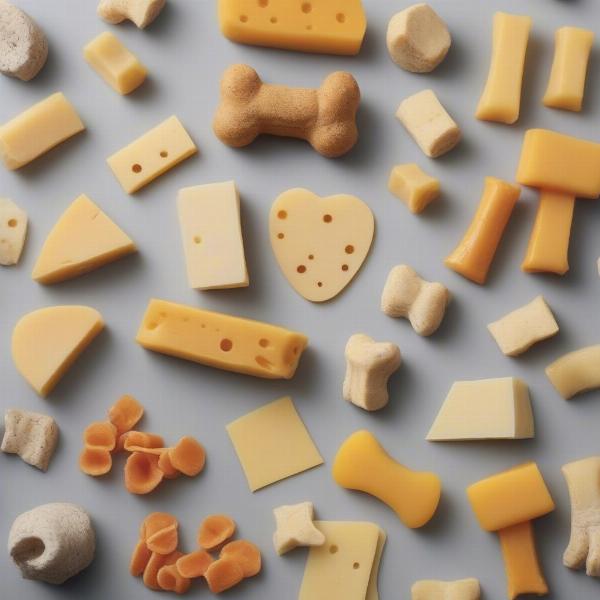Cheese bones are a popular dog treat, offering a tempting combination of flavor and chew satisfaction. But are they a safe and healthy choice for your furry friend? This article dives deep into the world of cheese bones for dogs, exploring their benefits, risks, and everything you need to know to make informed decisions about including them in your dog’s diet.
Understanding the Appeal of Cheese Bones for Dogs
Dogs love to chew, and cheese bones provide a long-lasting chewing experience that can help alleviate boredom and anxiety. The enticing cheesy flavor adds to their appeal, making them a highly motivating reward for training or simply a delicious treat. However, it’s crucial to understand the potential downsides and choose cheese bones wisely.
The Potential Benefits of Cheese Bones
Chewing on cheese bones can offer certain benefits for dogs. The act of chewing helps to scrape away plaque and tartar buildup, promoting dental health. It also provides mental stimulation, which can be especially beneficial for active breeds prone to boredom. Furthermore, cheese bones can be a good source of calcium and protein, although the amounts vary depending on the specific product.
Navigating the Risks of Cheese Bones
Despite their appeal, cheese bones come with potential risks. Hard cheese bones can pose a choking hazard, especially for smaller dogs or aggressive chewers. Splintering can also occur, leading to mouth injuries or digestive problems if swallowed. Additionally, some cheese bones are high in fat and sodium, which can contribute to weight gain and other health issues in dogs prone to these conditions. Always supervise your dog when they are enjoying a cheese bone.
Choosing the Right Cheese Bones for Your Dog
Not all cheese bones are created equal. When selecting a cheese bone for your dog, consider the following factors:
- Hardness: Opt for softer cheese bones that are less likely to splinter or cause choking.
- Ingredients: Look for natural cheese bones with minimal additives or preservatives. Avoid bones combined with rawhide, which can be difficult to digest.
- Size: Choose a size appropriate for your dog’s breed and chewing habits.
- Your dog’s individual needs: Consider your dog’s age, health, and chewing style. If your dog is a particularly aggressive chewer, a cheese bone might not be the best choice.
Are Cheese Bones a Good Option for Puppies and Senior Dogs?
For puppies, choose very soft cheese chews specifically designed for their developing teeth. Senior dogs with dental issues may benefit from softer cheese bones as well. However, always consult your veterinarian before introducing any new treats to your puppy or senior dog’s diet.
 Different cheese treats for dogs
Different cheese treats for dogs
Alternatives to Cheese Bones
If you’re looking for other chew options, consider yak bones for dogs, marrow treats for dogs, peanut butter bones for dogs, or cheese sticks for dogs. These can offer similar chewing satisfaction with potentially fewer risks. You can even find festive treats like a dog cheese advent calendar for special occasions.
Conclusion
Cheese bones can be a tasty and enjoyable treat for dogs, but it’s essential to choose wisely and supervise your dog while they are chewing. By considering the potential risks and benefits and selecting the right type of cheese bone, you can help ensure a safe and enjoyable chewing experience for your furry friend. Remember to always consult with your veterinarian if you have any concerns about your dog’s diet or chewing habits.
FAQ
- Are all cheese bones safe for dogs? No, some cheese bones can pose choking hazards or cause digestive problems. Choose carefully and always supervise your dog.
- Can puppies have cheese bones? Puppies can have soft cheese chews designed for their developing teeth.
- What should I do if my dog swallows a large piece of cheese bone? Contact your veterinarian immediately.
- Are cheese bones good for dog’s teeth? Chewing can help clean teeth, but excessive chewing on hard cheese bones can damage them.
- How often can I give my dog a cheese bone? Cheese bones should be given as an occasional treat, not as a regular part of your dog’s diet.
- What are some good alternatives to cheese bones? Yak bones, marrow treats, peanut butter bones, and cheese sticks are some good alternatives.
- Can cheese bones cause diarrhea in dogs? Yes, if your dog is lactose intolerant or consumes too much cheese, it can cause diarrhea.
About ILM Dog
ILM Dog is your trusted international resource for expert advice on dog care and breeding. We offer a wealth of information on dog breeds, health, training, nutrition, grooming, and much more, catering to both new and experienced dog owners worldwide. Whether you’re seeking guidance on choosing the right breed or need tips on dog nutrition, ILM Dog is here to support you. Contact us today for personalized advice: [email protected] or +44 20-3965-8624.